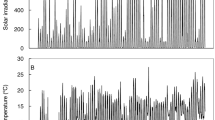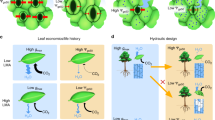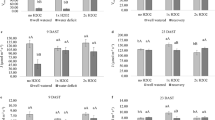Abstract
GROWTH and accumulation of dry matter in plants are dependent on the water status of the photosynthetic tissues1–3. Stomatal closure, resulting from the increased water stress in the leaf, is usually considered to be the main cause of reduced photosynthesis4,5. Stomatal closure is not, however, a satisfactory explanation for reduced photosynthesis, especially in those cases where it has been shown that there is no direct relationship between the degree of stomatal opening and carbon dioxide fixation6,7. It was suggested that damage by desiccation is caused, at least partly, by structural changes in the cytoplasm8 and changes in the hydration of chloroplasts9. Some evidence showing a good correlation between the degree of hydration of the tissue and its photosynthetic activity in leaves with fully opened stomata has been produced10. We have therefore investigated the effect of drought and dehydration on the photochemical activity of chloroplasts.
This is a preview of subscription content, access via your institution
Access options
Subscribe to this journal
Receive 51 print issues and online access
$199.00 per year
only $3.90 per issue
Buy this article
- Purchase on Springer Link
- Instant access to full article PDF
Prices may be subject to local taxes which are calculated during checkout
Similar content being viewed by others
References
Upchurch, R. P., Peterson, M. I., and Hagan, R. H., Plant Physiol., 30, 297 (1955).
Stocker, O., Eighth Congress Int. Bot., Paris, 223 (1954).
Stocker, O., in Handbuch der Pflanzenphysiology, 2, 639 (edit. by Ruhland, W.) (Springer, 1956).
Pisek, A., and Winkler, E., Protoplasma, 66, 597 (1956).
Larcher, W., Bull. Res. Council Israel, 8 D, 213 (1960).
Gaastra, P., Mededel. Landbauwogesch. Wageningen, 59, 1 (1959).
Gaastra, P., in Environmental Control of Plant Growth (edit. by Evans, L. T.) (Academic Press, 1963).
Levitt, J., The Hardiness of Plants (Academic Press, 1956).
Richards, L. A., and Wadleigh, C. H., in Soil Physical Conditions and Plant Growth (edit. by Show, B. T.) (Academic Press, 1952).
Slavik, B., in The Water Relations of Plants (edit. by Rutter, V. S., and Whitehead, F. H.) (Blackwell, Oxford, 1963).
Arnon, D. I., Plant Physiol., 24, 1 (1949).
Lowry, H. O., Rosenbrough, N. J., Farr, A. L., and Randall, R. F., J. Biol. Chem., 193, 265 (1951).
Avron, M., Biochim. Biophys. Acta, 40, 257 (1960).
Avron, M., and Shavit, N., Analytical Biochem., 6, 549 (1963).
Gromet-Elhanan, Z., and Avron, M., Biochem. Biophys. Res. Commun., 10, 215 (1963).
Author information
Authors and Affiliations
Rights and permissions
About this article
Cite this article
NIR, I., POLJAKOFF-MAYBEP, A. Effect of Water Stress on the Photochemical Activity of Chloroplasts. Nature 213, 418–419 (1967). https://doi.org/10.1038/213418a0
Issue Date:
DOI: https://doi.org/10.1038/213418a0
This article is cited by
-
Increased photoinhibition in dehydrated leaves of hot pepper (Capsicum annuum L.) is not accompanied by an incremental loss of functional PSII
Journal of Plant Biology (2004)
-
Electron transport, Photosystem-2 reaction centers and chlorophyll-protein complexes of thylakoids of drought resistant and sensitive Lupin piants
Photosynthesis Research (1993)
-
Structure and activity of chloroplasts of sunflower leaves having various water potentials
Planta (1976)
Comments
By submitting a comment you agree to abide by our Terms and Community Guidelines. If you find something abusive or that does not comply with our terms or guidelines please flag it as inappropriate.



